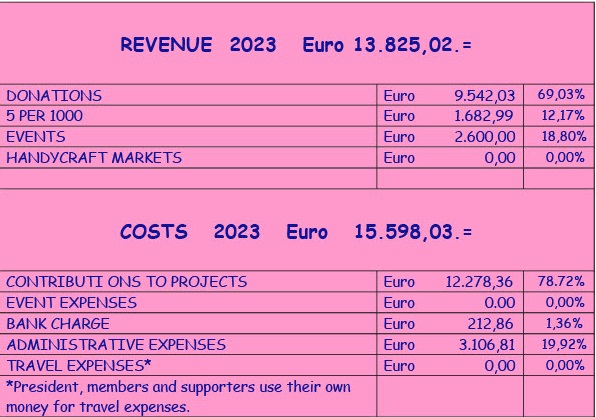The 2023 budget, as usual, closed with a deficit. It was a significantly lower year than the previous one in terms of income, but above all there was a significant increase in expenses, due to the change in the social structure, as per the reform of the Third Sector. We decided to give particular solidity to our Association by opting for the legal status of an ETS with legal personality. This entailed a non-repayable payment as a guarantee for the granting of legal status in the amount of EUR 15,000.00, borne by the Presidency and not counted in this budget, and a cost for notary fees of about EUR 3,000.00, which brought total administrative expenses to almost 20% of costs and as an obvious consequence, contributions to projects this year are 78.72% instead of the usual 97/98/99%. But now the Association has the means and the structure to go ahead even besides the current management. Because the projects continue.
This year we completed the second year of the Chipangali district volunteer teacher training course and handed over the third school. Of the original project ‘Santina Gusmini’s Kindergartens’, only the fourth school is missing, which we will start to build as soon as the rainy season is over. We were also able to complete and publish our training course manual, which can be useful for any association or local authority that needs a tool to coordinate the basic training of volunteer ECE school teachers.
But the completion of our second project does not mean we stop here.
These days/weeks, we are working on two goals: to prepare a questionnaire to get direct information on the impact of the Project on: children, parents, teachers, communities, in the villages where the teachers trained by us have gone to work. We want to know whether and to what extent our work has produced results.
At the same time, given how much the course was particularly appreciated by all those involved: students, trainers, parents of the children, communities, ministry, we are considering a possible replication in a different district, again in the Eastern Province, which is even more in need, because it is reached by hardly any associations, of support in training and in the presence of teachers and adequate school buildings.
It will therefore be a 2024 of innovation and planning.

